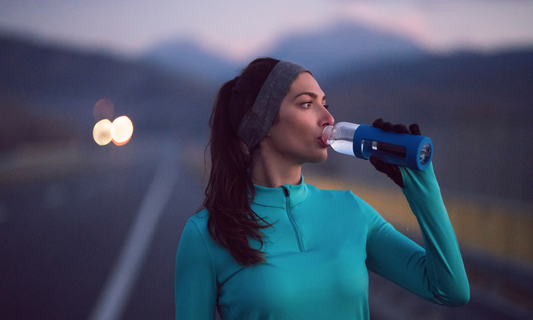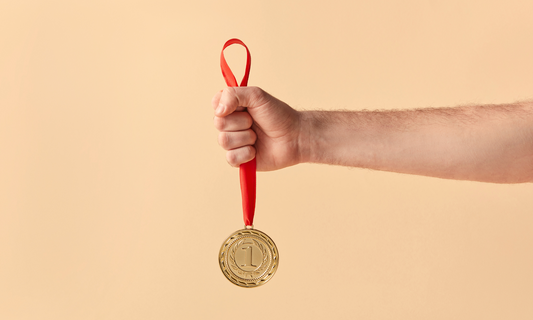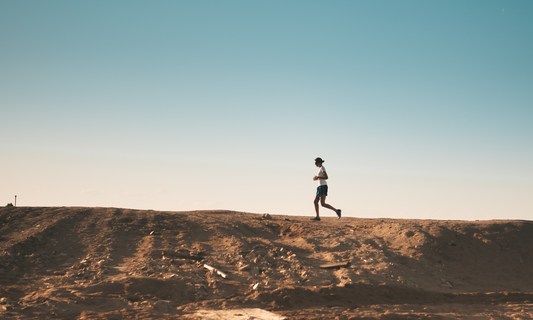What to drink after sport?

Hydrating your body after exercise is an often underestimated but essential part of sports recovery . While we are generally aware of the importance of hydration , understanding why and how to hydrate effectively after exercise is essential for all athletes and fitness enthusiasts.
The importance of hydration after sport
Post-exercise hydration plays a very important role in recovery and optimizing sports performance . After intense physical exercise, the human body suffers losses of water and electrolytes , which it is important to compensate for to restore physiological balance and promote recovery so that you can continue your sessions!
First of all, water is essential for the muscle recovery process. During exercise, muscles are stressed, which causes micro-lesions in your muscle fibers. Adequate hydration will accelerate this repair process and help reduce post-exercise muscle soreness . This occurs through the supply of nutrients to muscle cells, which will accelerate their regeneration.
Proper hydration will therefore restore the body's water balance . During exercise, the body loses not only water, but also a significant amount of minerals through perspiration , especially sodium. These losses must be compensated to maintain the proper functioning of the nervous system, acid-base balance and osmotic pressure.
To avoid fatigue and optimize recovery, it is necessary to replenish water and mineral reserves after exercise. Electrolytes such as sodium, potassium, calcium and magnesium play an important role in muscle contraction , nerve transmission and the balance of body fluids . A suitable drink , rich in electrolytes, helps restore these levels and limit the appearance of cramps and aches as well as electrolyte imbalances.

Hydration also plays a role in regulating body temperature . During exercise, your body's internal temperature can increase. Perspiration then allows water to be used as a thermal energy carrier to help cool you down. After exercise, drinking water will help you avoid dehydration and ensure a gradual return to normal body temperature, especially after training in hot or humid weather conditions.
Next, proper hydration will promote kidney function and help eliminate waste and toxins produced during physical exertion. This can include ammonia and lactic acid, the buildup of which can contribute to fatigue and reduce athletic performance. By drinking enough fluids after exercise, athletes help their bodies eliminate these metabolic byproducts more efficiently.
Finally, it is important to adapt your hydration to your needs, taking into account the duration and intensity of the effort, as well as the environmental conditions. It may be insufficient to rely solely on the sensation of thirst because it does not always reflect the actual losses of water and electrolytes. A little tip that will allow you to optimize your recovery is to integrate a suitable rehydration strategy , including drinks containing electrolytes.
The risks of dehydration after sport
Neglecting hydration after a workout is like ignoring a warning light on your car's dashboard—the consequences can be serious! Since your water needs are increased, without adequate rehydration , your body can't recover properly.
Decreased levels of sodium, potassium, calcium and magnesium can lead to neuromuscular disorders , decreased strength and increased fatigue. Inadequate hydration also impairs thermoregulation , increasing the risk of hyperthermia , especially in hot weather.
The elimination of toxins produced during exercise, such as lactic acid and ammonia, relies on proper hydration. If fluid intake is insufficient, these waste products accumulate, slowing recovery and reducing performance during subsequent workouts. In the long term, chronic dehydration can affect kidney and cardiovascular function. In short, not hydrating properly after sport compromises your recovery , your performance and even your long-term health!
Practical tips for determining how much water to drink after exercise
To effectively address your hydration needs after exercise , it's essential to take a personalized approach. While scientific guidelines recommend replenishing about 1.5 liters of water for every kilogram of weight lost during exercise (so if you lose 2 kg during exercise, you'll need to consume 1.5 x 2 = 3 liters of water!). This method can be difficult to implement on a daily basis... So here are some more accessible tips:
Listen to your body
As soon as your session is over, start by drinking small amounts of water or an electrolyte drink. Then, continue to hydrate regularly in the hours that follow. Feeling thirsty is a good indicator, but it's best to anticipate this and not wait until you're thirsty to drink.
Use urine color as an indicator
A good way to assess your hydration level is to observe the color of your urine. A light color generally indicates adequate hydration, while darker urine can be a sign of dehydration.

Include foods rich in water
Foods like fresh fruits and vegetables can also help with rehydration. Including these foods in your post-workout meal is a great way to replenish fluids.
Choose drinks with mineral salts for intensive training.
After a workout in extreme heat or for a long time, just water isn't always enough. Drinks containing electrolytes, such as Hydratis , help to effectively replenish the sodium, potassium and magnesium reserves lost through sweat.
How to Hydrate After Exercise? A Simple Explanation
Imagine you've just finished an intense cycling session . You've sweated and lost a lot of water and salt (sodium). Now it's time to rehydrate, that is, put water and salts back into your body.
But what is the best way to achieve this?
A scientific study examined three ways to rehydrate after exercise: drinking water (mineral or tap) , taking a sports drink or finally a hypotonic drink . It turned out that the hypotonic solution was the most effective because it contains an optimal concentration of electrolytes , especially sodium . Sodium is very important because it is what you lose the most when sweating. And to rehydrate properly, you need not only to replace the water, but also the lost sodium, which tap water does not do. The hypotonic solution does this very well because it has a higher sodium concentration than regular mineral water.
Sodium is a key element in post-exercise rehydration. It helps restore fluid balance by facilitating water retention in the body and limiting urinary excretion. Indeed, it helps maintain plasma osmolarity, which promotes better water absorption in the intestine and reduces post-exercise diuresis. In addition, sufficient sodium intake after heavy sweating will help prevent hyponatremia, an imbalance that can affect neuromuscular function and blood pressure regulation. Thus, a rehydration drink containing sodium will optimize fluid and electrolyte recovery, ensuring a more efficient restoration of physiological functions after exercise.
And guess what? Hydratis offers just such hypotonic solutions! By choosing these drinks, you'll ensure you're effectively hydrated after exercise.
The Hydratis solution
Post-exercise hydration is a fundamental element of recovery, helping to restore fluid balance, prevent electrolyte imbalances and limit the risk of muscle and tendon injuries . After intense exercise, it is not enough to drink water: it is essential to provide the electrolytes lost through sweat, especially sodium, potassium and magnesium.
Hydratis solution has been specially formulated to help maintain proper hydration. Thanks to its electrolyte composition, it promotes more efficient water absorption while providing antioxidants that are also beneficial post-workout! By restoring sodium and other mineral levels more quickly, Hydratis contributes to optimal recovery and a reduction in feelings of thirst and fatigue.
For effective hydration after exercise, it is recommended to dissolve two Hydratis lozenges in 500 mL of water, and adjust consumption according to your needs and the intensity of your exercise. You can take up to 5 lozenges per day, depending on your fluid and electrolyte losses.

Hydration after exercise is therefore essential for recovery and athletic performance . Proper hydration will help stabilize water balance, support muscle repair, maintain optimal thermoregulation, and avoid electrolyte imbalances. To achieve this, it is recommended to adopt appropriate strategies, such as assessing urine color, incorporating water-rich foods, and using electrolyte-rich drinks. By opting for solutions like Hydratis, athletes can optimize their recovery and maintain their physical fitness to face their next sporting challenges with confidence!
Bibliography
PharmaGDD. June 27, 2023. “Athletes: How to Stay Hydrated”
Lightinfitness. 01/29/2023. "How much water per day during training"
Sdpo-mag. “Dehydration in sport by Amandine Le Cornec”











